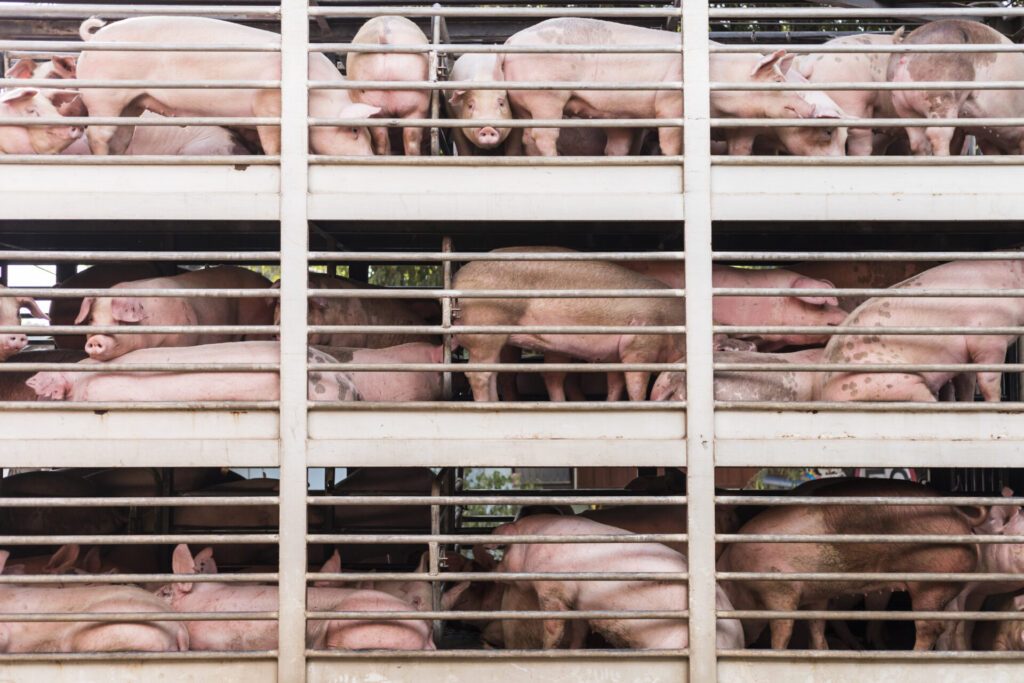Animal transport: implementing welfare regulations in the field

Improving the conditions under which animals are being transported by air, sea and land requires international cooperation. For this reason, the November 2022 workshop organised in Cairo (Egypt) by WOAH brought together the key actors of animal transport between Europe, the Middle East and North Africa. This “Whole Journey Scenario” was an opportunity to exchange best practices and to bridge the gaps between international regulations and the actual situation of animals, in the framework of the animal welfare platform for Europe. Dr Rachel Dodeen, from Jordan, and Dr Ubeda Ortiz, from Spain, both participated in the workshop.
Animal transport and welfare: from citizen concerns to economic losses
“Bad conditions during animal transport increase the stress of the animals and have a direct effect on their health. They can cause injuries, sickness, and in some cases the death of animals that were healthy before starting transport. For this reason, bad transport conditions are not only an ethical problem, they also have serious economic consequences for exporters. The spread of diseases among weak or sick animals becomes a problem that landing countries have to face”, says Dr Ubeda Ortiz, one of the official veterinarians working at the exit point of live animals at the port of Cartagena, in Spain. Cartagena, one of the main ports in Europe for the export of live animals, is an ending point for road vehicles, and frequently the last point where animal welfare conditions can be checked before ships reach their destination.

Enforcing national laws on animal transport
Dr Rachel Dodeen works in Jordan, at the other end of a shipping route: she is Head of the Quarantine department for Jordan’s ministry of Agriculture. Like Dr Ubeda Ortiz, Dr Dodeen is an animal welfare focal point with WOAH. In Jordan, animal welfare regulations exist, with a procedure to follow and penalties in case of violation. “But written law is not enough. It has to be enforced”, Dr Dodeen says. “This is why we need a continuous cooperation between veterinary authorities of exporting, transit, and importing countries, so that they can exchange reports on animal welfare violations or poor implementation.”
Training all stakeholders of animal transport is key
In Jordan, most imported animals arrive through the port of Aqaba, on the Red Sea. From Dr Dodeen’s experience, “what makes a real difference for animal welfare is to have a well-planned journey, and well-trained staff: vets, drivers, handlers, owners, and government officials, who are able to check and investigate animal shipments properly”.
From Spain, Dr Ubeda Ortiz agrees: “The economic operators need to be fully aware of the impact of animal transport conditions. Animal welfare rules may be seen as extra costs, bringing less animals in a given vehicle, or spending more in provisioning and expensive equipment, but they need to understand that this investment is not just mandatory by law, it also helps to increase the value of their operation. When this awareness exists, it is much easier to deal with the rest of the challenges”, he says.
Less than 40% of Members in Europe cooperate with the country of destination before, during or after the journey.
Source: Survey – Long distance transport of live animals: WOAH’s standards and best practices including societal perception and communication aspects (47 out of 53 Members from Europe participated)
A new contact network in the animal welfare platform for Europe
The “Whole Journey Scenario” workshop that took place in 2022 was an opportunity for animal welfare officials working on similar transportation routes to exchange experiences with their peers, and to see how best to deal with the most challenging situations, such as dealing with careless handlers or disregarded regulations. “The workshop brought together representatives from European countries, who are mostly exporters, and Middle East countries, who are mostly importers of live animals. We identified a weakness point: the lack of communication and follow-up, once a trip has started.”, Dr Dodeen says.
“One of the key takeaways from this workshop was to start building a contact network, that will be very useful to exchange information and better detect issues before a shipment reaches its final destination”, Dr Ubeda Ortiz says. “It will be particularly precious in case of an emergency, to clarify the circumstances that led to a situation and help prevent it in the future. Contingency plans often involve authorities from different countries, so knowing and understanding each other is crucial”.
The Observatory: monitoring the implementation of animal welfare standards
In addition to organising specific workshops on the topic, WOAH is monitoring the implementation of animal welfare during transport standards by Members. The first Observatory annual report which was released in 2023 includes a section on animal welfare. The Organisation now intends to work further on animal transport by conducting a thematic study which will explore the barriers and challenges Members may face when implementing standards related to that topic.
Improving cross-boundary cooperation for animal welfare
The construction of international networks of peers, to improve cooperation and face emergencies, is one of WOAH’s key missions. For this reason, the issue of animal transport was addressed during the last regional conference for Europe, in October 2022. Furthermore, the current Action Plan of Platform on Animal Welfare for Europe (2021-2023) includes training materials, training workshops and the creation of a network of Contact Points on Long-Distance Transportation for Europe. The network has a meeting planned in Ireland in June 2023, with a regional “Whole Journey Scenario” workshop session. A multi-regional “Whole Journey Scenario” workshop for Europe, North Africa and the Middle East is due to take place in Tunisia in the second semester of 2023 to further strengthen communication and collaboration to improve animals’ welfare during transport.
